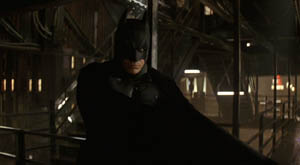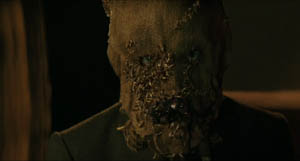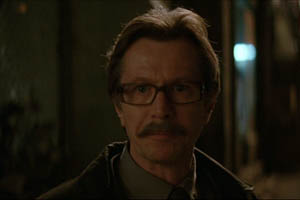|
Remember all those Batman films they made starting in 1989? Not really? Good for you. Yes? Well, pretend you don't. This time, they're doing it right. 
After 1997, when Joel Schumacher took the Batman franchise, strapped several sixteen-ton weights to it in the way one would expect one of his villains to do, and dropped it into the canal, Warner Brothers let the series sit on the shelf, unwilling to sink any money into what the public would likely perceive as a sequel to the disasterously shitty Batman and Robin. Eight years would pass before another film would grace the screen, and when it arrived, it was not another entry in the previously established continuity but a complete restart, now helmed by art-house director Christopher Nolan. A man who makes a habit out of structuring stories around characters and motivations, Nolan was a near-perfect choice to breathe some real life into this classic character by digging into his inner workings and making the myth into a real person. Or close enough. I once read, in a review for one of the Spiderman movies, that while Batman was driven by revenge, Spiderman was driven by a more insidious emotion: guilt. Kudos must therefore go to Nolan and his screenwriters for subtly altering Batman's origin story to include this facet, as well. Young Bruce Wayne falls into an old well and is terrified by the bats that swarm out in the wake of his arrival. Later, attending an opera with his parents, he becomes nervous and uncomfortable with the images of stage acrobats in black costumes he sees, and asking that they depart early, inadvertantly leads his father and mother into the confrontation with small-time hood Joe Chill that claims them both. In his mind, his own irrational fear has taken his parents from him. Later in life, his anger overpowers his guilt, and he blames the killer himself. Childhood friend and up-and-coming assistant DA Rachael Dawes suggests a third option for the blame: the unchecked corruption in Gotham City's legal system that allows organized crime to run rampant, of which his parents' killer was but a small symptom. Unsure of what to think, Bruce disappears into the night, determined to learn the mind of the criminal, and the means to his defeat. While Tim Burton's 1989 Batman had briefly touched on the deaths of Bruce's parents, the origins of Batman himself had never been filmed, or in fact even precisely chronicled in the comics. Batman Begins essentially creates a detailed origin story out of what had been implied here or there, filling in the gaps with its own interpretations. After training under the tutlage of the avuncular Henry Ducard, Bruce comes to realize what he does and doesn't want to be. He does want justice; he doesn't want to be a killer, the thing he hates the most. Upon returning to his home, he finds things to be still limping along much as he left them. Crime is rampant, the police are corrupt, and his own company has been hijacked by a less-than-idealistic chairman of the board. As he begins to get his sea legs where crimefighting is concerned, he makes an uneasy ally of Sergeant Jim Gordon, who finally emerges into a Batman film as a fully fleshed-out character, rather than the human set dressing he had been in the previous spate of movies. 
Similarly to the last example of a good Batman film, Batman Returns, this film gives us a trio of bad guys for our hero to tackle, and they're of similar types to those in Returns: the power-hungry tyrant, the freak, and the sympathetic one convinced that he or she is the hero of the piece. And much unlike the cartoonish disasters that followed Burton's stint on the series, there's an actual logic to the way in which the multiple villains work together, rather than just forming arbitrary alliances to defeat Batman. Who, after all, is Batman? Gotham has yet to find out. What it will eventually discover is that Batman is, as an icon, fear itself, a motif repeated throughout the film. Mob boss Carmine Falcone uses fear to keep the legal system out of his business. The Scarecrow, a longstanding Batman villain who took far too long to finally come to the screen, uses a panic-inducing drug to incapacitate his enemies. Batman uses fear against its traditional practitioners, trying to tip the scales back from the coming disaster. For the first time, Batman comes off as genuinely threatening-he may not believe in killing, but his prey doesn't know that. When he snarls for a low-level hood who has just sworn to God that he knows nothing, "Swear to ME!" and drops him hurtling headfirst towards the distant pavement, a neophyte who'd just walked in at that moment could well imagine he was seeing the bad guy of the story, some emotionally disturbed madman. And Nolan, one gets the feeling, wants it to be that way. 
Nolan's previous films, even when structured fantastically, were grounded in a down-and-dirty reality. The Batman of this film is no inhabitant of some fantasy abstraction of the real world. There is no art design gone wild. Everything about the film is intended to make the idea of Batman into a realistically plausible one. If you think about it for a few minutes, the artiface doesn't actually hold up, but the semblance is strong enough to suspend disbelief. Comfortable, distinct lines of good and evil are also blurred here, as per Nolan's wont; the primary villain believes himself to be the savior of humanity, making necessary sacrifices, while Batman must come to terms with what it means to be a hero. "My anger outweighs my guilt," he tells his mentor early on; we watch with anticipation over the next two hours to see if his goodness will outweigh his anger. It's a rewarding trip, and one which will leave audiences debating the philosophy of his ultimate solution. At long last Batman has been done with a richness of character and a true sense of menace, and it's been worth the wait. -review by Matt Murray
|
|
||||||||